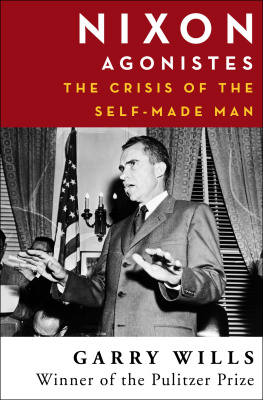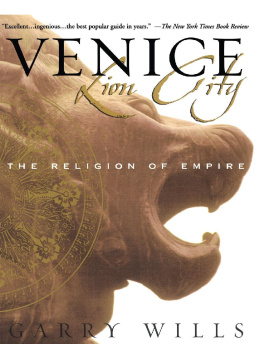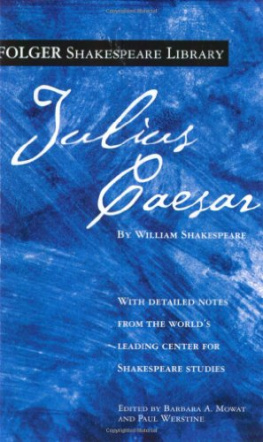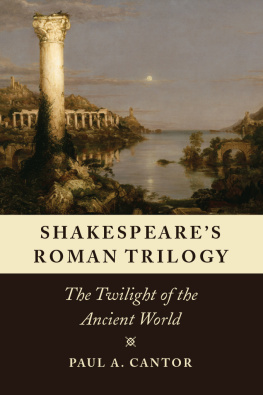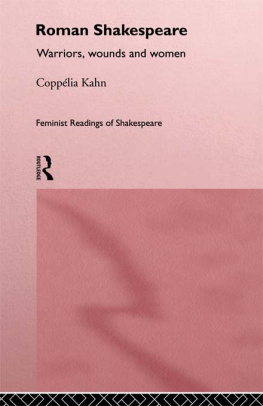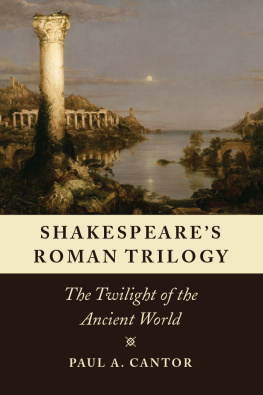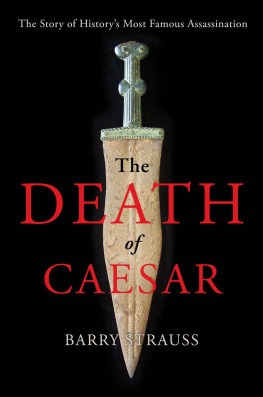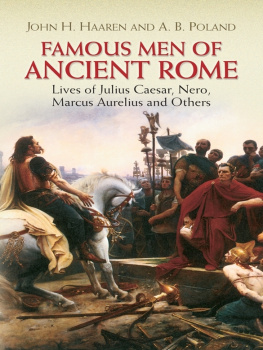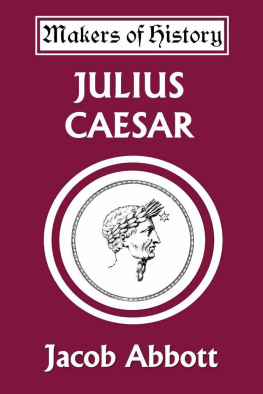The Anthony Hecht Lectures in the Humanities
Rome
and
Rhetoric
Shakespeares Julius Caesar
Garry Wills
Yale UNIVERSITY PRESS NEW HAVEN & LONDON
This book was first presented as the Anthony Hecht Lectures
in the Humanities given by Garry Wills at Bard College in
2009. The lectures have been revised for publication.
Copyright 2011 by Garry Wills.
All rights reserved.
This book may not be reproduced, in whole or in part,
including illustrations, in any form (beyond that copying
permitted by Sections 107 and 108 of the U.S. Copyright
Law and except by reviewers for the public press), without
written permission from the publishers.
Yale University Press books may be purchased in quantity
for educational, business, or promotional use. For
information, please e-mail sales.press@yale.edu (U.S. office)
or sales@yaleup.co.uk (U.K. office).
Set in Janson type by Integrated Publishing Solutions,
Grand Rapids, Michigan.
Printed in the United States of America.
Library of Congress Cataloging-in-Publication Data
Wills, Garry, 1934
Rome and rhetoric : Shakespeares Julius Caesar / Garry Wills.
p. cm.
Includes bibliographical references and index.
ISBN 978-0-300-15218-0 (cloth : alk. paper) 1. Shakespeare,
William, 1564-1616. Julius Caesar. 2. Caesar,
JuliusIn literature. 3. Rhetoric, Renaissance.
4. RomeIn literature. I. Title.
PR2808.W58 2011
822.3 3 dc22
2011017965
A catalogue record for this book is available from the British Library.
This paper meets the requirements of ANSI/NISO
Z39.48-1992 (Permanence of Paper).
10 9 8 7 6 5 4 3 2 I
The Anthony Hecht Lectures in the Humanities, given biennially at Bard College, were established to honor the memory of this preeminent American poet by reflecting his lifelong interest in literature, music, the visual arts, and cultural history. Through his poems, scholarship, and teaching, Anthony Hecht has become recognized as one of the moral voices of his generation, and his works have had a profound effect on contemporary American poetry. The books in this series will keep alive the spirit of his work and life.
To the memory of Anthony Hecht
Contents
ONE
Caesar: Mighty Yet
TWO
Brutus: Rhetoric Verbal and Visual
THREE
Antony: The Fox Knows Many Things
FOUR
Cassius: Parallel Lives
Rome and Rhetoric
ONE
Caesar
Mighty Yet
To begin with Caesar is to begin with a puzzle. Why is it called The Tragedy of Julius Caesar? Why not The Tragedy of Brutus? Brutus, after all, speaks almost five times the number of lines that Caesar does. For that matter, Cassius has three times the words of Caesar. Antony has twice as many. Even the minor character Casca has almost as many lines (139) as Caesar does (155).to perform half a play? (As we shall see, the great exception here was John Gielgud, with a definitive performance of the role in 1977.) When Caesar comes briefly back as a ghost, he speaks only sixteen words. What kind of play backs its main character off into a corner this way?
Cicero
I would like to wind my way into this problem with an even odder use of a character. Cicero is much on the minds of the plays conspirators. They talk almost obsessively about him, yet he is allowed to speak only nine measly lines. I will argue that the reasons for Caesars small role and for Ciceros are connected. But first, consider how much people say about Cicero, who is held to almost total silence himself. In the first scene where Brutus speaks, he watches the company leave the site where Caesar was offered a crown. He describes the reaction of Cicero, which was obviously one of disgust at the charade:
The angry spot doth glow on Caesars brow,
And all the rest look like a chidden train.
Calphurnias cheek is pale, and Cicero
Looks with such ferret and such fiery eyes
As we have seen him in the Capitol
Being crossed in conference by some senators.
(1.2.183-88)
Brutus wants to know more about Ciceros reaction to the offered crown. When Casca, who was there, describes what happened, Brutus asks:
Did Cicero speak anything?
CASCA:Ay, he spoke Greek.
BRUTUS:To what effect?
CASCA:Nay, an I tell you that, Ill neer
look you ithface again. But those that
understood him smiled at one another, and
shook their heads; but for mine own part, it
was Greek to me. (1.2.278-84)
Since we are alerted to the fact that Cicero opposed the crowning of Caesar, we must wonder why he is not taken into the conspirers circle. Whatever the ancient or modern views of Cicero, the Renaissance revered him as a champion of liberty and the republic. That is how he figures in Shakespeares source, Plutarch. Every one of the conspirators against Caesar, all but Brutus, wants Cicero to be a confederate in their attempt.
CASSIUS:But what of Cicero? Shall we sound him?
I think he will stand very strong with us.
CASCA:Let us not leave him out.
CINNA: No, by no means.
METELLUS:O, let us have him, for his silver hairs
Will purchase us a good opinion
And buy mens voices to commend our deeds.
It shall be said his judgment ruled our hands.
Our youths and wildness shall no whit appear,
But all be buried in his gravity. (2.1.140-48)
Though Brutus excluded Cicero from the attack on Caesar, it was Cicero who made the most eloquent speeches (his so-called Philippics) against Antony when Antony became the champion of Caesars legacy. And Plutarch treats Antonys revenge on Cicero as his most heinous crime:
And Antonius also commanded them to
whom he had given commission to kill
Cicero, that they should strike off his head
and right hand, with the which he had
written the invective Orations (called
Philippides) against Antonius. So when the
murtherers brought him Ciceros head and
hand cut off, he beheld them a long time
with great joy, and laughed heartily, and
that oftentimes for the great joy he felt.
That reflects a common view in antiquity, that Antony took a savage revenge on Cicero. The Roman poet Martial said that this guarantees that every tongue in the world will speak out against Antony.
The shock of Ciceros death is registered in the play when Messala reports the proscriptions:
MESSALA:Octavius, Antony, and Lepidus
Have put to death an hundred senators.
BRUTUS:Therein our letters do not well agree.
Mine speak of seventy senators that died
In their proscriptions, Cicero being one.
CASSIUIS:Cicero one?
MESSALA: Cicero is dead,
And by that order of proscription.
(4.3.I74-79)
Why, given Ciceros opposition to Caesars faction as carried on by Antony, was he not included in the plot, where his judgment and white hairs could have justified the plotters cause? Brutus gives his reason in the nighttime meeting at his orchard. When the others ask for Cicero to join them, he says:
O, name him not! Let us not break with him,
For he will never follow anything
That other men begin. (2.1.150-52)
That is not the reason given by Plutarch for excluding Cicero from the coup against Caesar. Plutarch says that Cicero is too fainthearted as well as too oldthough Shakespeares Metellus says that his old age would be an advantage to the younger conspirators. Brutus attributes to Cicero Plutarch, while admitting that Cicero was vain about his own accomplishments, asserted that he was extraordinarily generous in recognizing the achievements of others, just the opposite of what Brutus alleges:
Yet did he not malice or envy any others glory, but would very frankly praise excellent men, as well those that had been before him, as those that were in his time . There was not a famous man in all his time, either in eloquence, or in learning, whose fame he hath not commended in writing, or otherwise in honorable speech of him.
Next page

